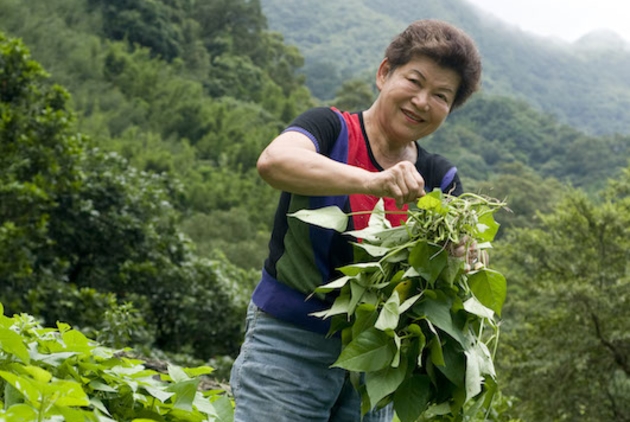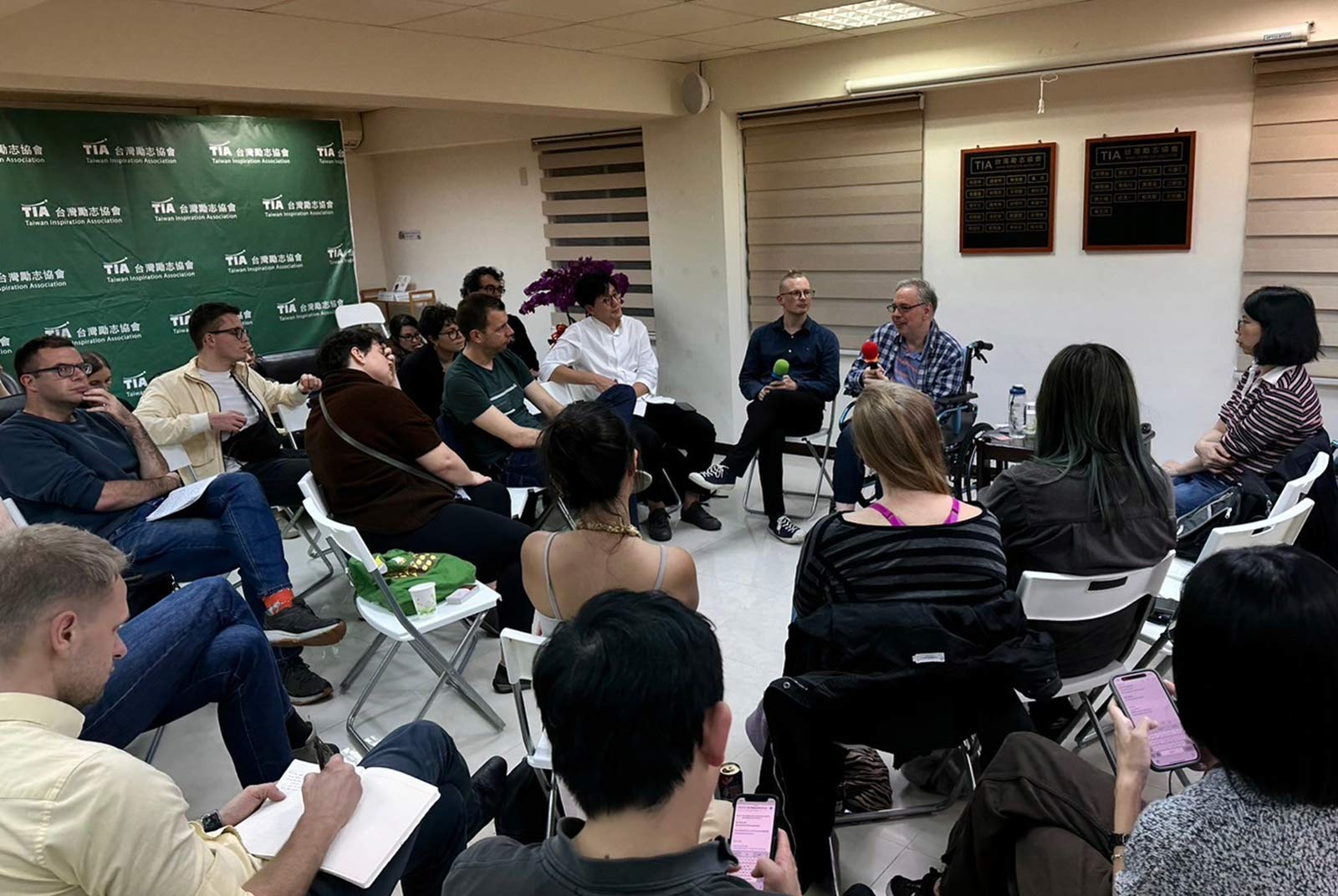Toucheng Leisure Farm
Yilan Organic Farm Built by 80-year-old Grandma, Popular Among International Tourists

Source:Toucheng Leisure Farm
This legendary woman near her eighties used to be a primary school teacher and the owner of a garment factory. But when she was 40, she retired to the country to create an organic farm in the style of early Taiwan. The down-to-earth attraction entertains 60 thousand tourists from around the world every year. Even a Swiss chef has decided to make his home here.
Views
Yilan Organic Farm Built by 80-year-old Grandma, Popular Among International Tourists
By Chen, Yi-hanCSR@CommonWealth
“People often ask me: how do you determine what’s ‘organic’ food? Actually, all you need to do is observe if the soil is organic and fresh. Grab a handful of soil and see if it is loose and fluffy, then you will know! If the soil is tough, that means there are no worms, microorganisms, or anything living inside. You cannot grow organic food in such soil.”
Cho Chen-ming (卓陳明), founder of Toucheng Leisure Farm (頭城休閒農場), often uses this example to teach tourists and students how to determine the authenticity of organic farming.
The Leisure Farm is in the mountain region of Toucheng in Yilan. It’s one of the earliest traditional farms in Taiwan. The expansive farm of over 116 hectares is home to chickens, ducks, pigs, and cows. It also has an organic garden, a bamboo grove, and a farmhouse built in the traditional way. There’s a river that flows through here. This was Cho’s present to herself on her 40th birthday—a chance to live her childhood dream.
 Inside the farm, there’s a farmhouse built in the traditional way. (Source: Chen, Yi-han)
Inside the farm, there’s a farmhouse built in the traditional way. (Source: Chen, Yi-han)
“I really like the farm life. In the beginning, I bought this place for myself and my family. It just so happened the government was promoting a policy that supported leisure farms. We followed their footstep, but we never exploited the mountain,” Cho speaks with youthful energy and tells her story so eloquently, you cannot guess she is almost eighty years of age.
 This legendary woman near her eighties used to be a primary school teacher and the owner of a garment factory. But when she was 40, she retired to the country to create an organic farm in the style of early Taiwan. The down-to-earth attraction entertains 60 thousand tourists from around the world every year. Even a Swiss chef has decided to make his home here. (Source: Chen, Yi-han)
This legendary woman near her eighties used to be a primary school teacher and the owner of a garment factory. But when she was 40, she retired to the country to create an organic farm in the style of early Taiwan. The down-to-earth attraction entertains 60 thousand tourists from around the world every year. Even a Swiss chef has decided to make his home here. (Source: Chen, Yi-han)
Building a Farm Amateur-style
Cho is a legend in her own right. She was born in Taichung’s Qingshui District and studied in the Taipei Municipal University of Education (now the University of Taipei). After graduation, she taught for a while at a prestigious primary school. Taiwan’s economy was taking off, so she switched gears and invested in the clothing industry, becoming the boss of a garment factory. They were so successful their annual revenue was in the millions, and even when former President Lee Teng-hui toured the factory, he praised her for being a rare woman of her time. When she turned 40, Cho fulfilled her childhood dream and bought a farm in the mountain. She reinvented herself as a farm owner.
“In truth, I was conned into buying this piece of the mountain!” Cho does not hide her amateur spirit. She says she told her agent, “I don’t have a lot of money, but I want a big piece of land.” The agent said they’ll look at places in the Ruifang District, but they drove so far, they ended up looking in Yilan’s Toucheng. “The place was a wasteland back then, with grass as tall as people. The agent pointed into the distance and told me, all that land was mine. Only after we signed the deal did I discover—it didn’t include the piece of flat land we were standing on! I had to pay extra to get the complete plot.”
In the misty, grassy mountain, Cho built the Leisure Farm with her bare hands. The place is a natural paradise in summer. The mountain spring flows smooth and clear beneath clouds of white paper kite butterflies. There are a dozen different types of frogs and an organic rice farm. This natural school of ecology is popular with children and lauded as one of Taiwan’s hottest tourist attractions. In recent years, it’s attracted a fair share of international tourists and interns as well.
60 Thousand Tourists a Year and One Swiss Chef
“Twenty to thirty percent of our visitors are foreigners. We have around sixty thousand visitors every year. So, we built a Halal Muslim restaurant on the farm, and we hired a Swiss chef. We are used to receiving tourists from different countries. The chef also studies where the visitors are from and prepares customized cuisines for them with the harvest of the season,” says Tina Chiang (江富美), the marketing manager at the Leisure Farm.
Tsai Yung-Chieh (蔡勇捷) is a college senior from Malaysia who came specially to Toucheng to learn as an intern. He studied agriculture back in University Malaysia Sabah. Back when he was searching on the internet for an internship in Taiwan, Toucheng Leisure Farm caught his eye immediately. He explains, “Malaysia has only farms, not leisure farms that combine agriculture with tourism. I learned a lot here. I hope to bring the knowledge and skills I learn here back to Malaysia.”
Few people know the clouds of white butterflies and the singing tree frogs that made the farm their home were all the hard-won results of agricultural rehabilitation.

The cocoon of a paper kite butterfly. (Source: Chen, Yi-han)
“The paper kite butterfly is native to the northeastern seacoast. When it’s a baby caterpillar, it likes to feed on Parsonsia laevigata (爬森藤), so we deliberately planted those on the farm to attract paper kite butterflies. They are large, slow-moving, and their cocoons are a beautiful golden color, so they’re very good for tourists.” Lin Hong-da (林宏達), planning manager at the farm, explains how the farm maintains its ecology. He also points out the area is popular with Kurixalus eiffingeri (艾氏樹蛙), a type of tree frog native to Taiwan. “The farm works with frog researchers from National Dong Hwa University to conduct surveys every season. All our staff are members of the frog rehabilitation monitoring team. We want everyone to feel they’re deeply connected to this piece of earth.”
Have you read?
♦ Taiwan's Pop-up Vegetarian Night Market Phenomenon
♦ Taiwan's Global Noah’s Ark of Plants
♦ Taiwanese Chocolate Seduces the World
An Emotional Experience Brings Lessons of Preservation
Out of the farm’s 116 hectares, around 48 hectares are certified for planting organic Makino bamboo shoots. Another 2 hectares are organic vegetable gardens that mainly focus on traditional Taiwanese agricultural products, such as sweet potato leaves, water spinach, eggplants, Taiwanese pears, pumpkins, etc. Tourists are invited to help plant, remove weeds, add fertilizer. They also have a chance to experience harvesting the plants and cooking them into delicious dishes.
 The organic rice experience area on the farm. (Source: Chen, Yi-han)
The organic rice experience area on the farm. (Source: Chen, Yi-han)
Cho says smilingly, planting quinoa here is a challenge because you have to contend with grasshoppers, bush crickets, ladybugs, striped flea beetle…seven or eight different kinds of insects. But a diverse ecology is the fundamental requirement for planting organic food. “If I didn’t want to deal with this, I would’ve just used pesticide and gotten rid of all the pests!”
“Early every morning, I patrol the organic garden to check if the plants have been eaten by bugs or ruined by rain. Taking care of these plants take up most of my time.” Especially this year, Cho noticed from taking care of her plants how the effects of climate change are becoming more severe. “It kept raining after September last year and ruined lots of my produce. But this year, it did not rain before June, so lots of my plants almost dried up.” These warning signs from Mother Nature made her realize the importance of ecological protection and food and agricultural education.
In fact, long before Taiwan started to focus on food and agricultural education, the Toucheng Leisure Farm already had an organic rice experience area for children to learn to plant rice. However, the plan got off to a rocky start. (Read: Decision Support System Elevates Taiwan’s Rice Industry to Unprecedented Heights)
Cho says at first, she expected children who planted the rice to revisit often and observe every stage of the rice’s growth, such as weeding, fertilizing, flowering, and finally maturing. But modern children are too busy to visit the farm very often. “Afterwards, I separated the area into six sections: planting, growing, booting, flowering, maturing, and nurturing loaches. Tourists can see and participate in every stage of the rice’s life in one day.”
Why insist on letting visitors experience the entire life of rice? Cho’s tone becomes serious. “This is a living farm, it’s here to let people gain new experiences. Coming in contact with living things packs an emotional punch that people will learn to treasure.”
Motivating Local Farmers to Farm Organically
Visitors to the farm like to call her “Teacher Cho”. Children call her “Grandma Cho.” In over thirty years, she’s met more than ten thousand children and students. Some visitors even come back to the farm every year for nearly a dozen consecutive years. It’s like an annual tradition, like visiting mother’s house over the new year.
For owners of the farm, it’s fair to say Toucheng is doing very well and they have every reason to be satisfied. But this year, Cho has decided to step outside the farm and motivate local farmers to engage in friendly agricultural practices. She says, “Toucheng has resources from both the mountain and the sea. The potential for growth here is no less than in Taipei. We want young people to come back to the country and engage in friendly agriculture. Together, we will do what we can for the environment, and also build a home for the next generation.” Her altruistic spirit will surely initiate a positive feedback loop. Who knows, maybe Toucheng in the future will be very different from today.
Translated by Jack C.
Edited by Sharon Tseng












